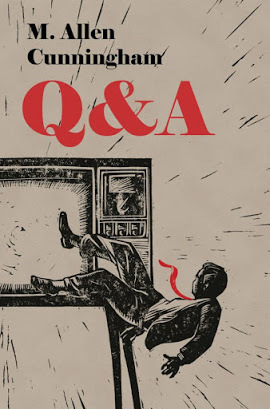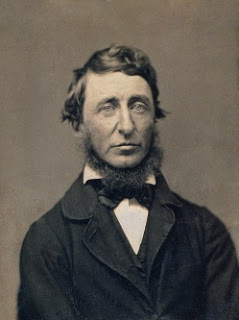M. Allen Cunningham's Blog, page 7
August 7, 2020
Secure Your Copy of Cunningham's New Book

What's it about? Among other things: reality television, TV politics, the triumph of incoherence, and deception via screens. Sound familiar?
(My favorite designer Nathan Shields created that kick-ass cover, by the way. It's a custom linocut.)
Published on August 07, 2020 12:30
July 12, 2020
Prime Passages: Thoreau by Henry Seidel Canby (1939)
For Henry David Thoreau's 203rd birthday, 12 July 2020: some choice excerpts from Canby's brilliant 1939 biography -- reminders about the growth and plight of genius.

"Overflowing with thoughts, he yet looked around for more, because he was living so intensely that his own thoughts choked his utterance. This description will do for any young writer. Thoreau's advantage lay in his resolve to find out what he was living before he made a book about it--to be, as he said to Emerson, first the idea itself.
[...]
"When a deep excitement of the mind finds a favorable environment, as it did in this Concord which was, indeed, a power plant of idealistic energy stepping up the spiritual voltage of the nineteenth century, an authentic moment in the history of civilization often follows.
[...]
"The two conditioning factors for writing anywhere, any time, are the quality of the imagination and the nature of the market. Later comes the fork of the road -- one way toward the competent and salable, the other toward the excellent and possibly unsalable. The completely successful [person] of letters is not [they] who writes for nothing, but rather the writer who learns how to do what [they] want -- and how to make readers pay for it. The predestined commercial writer is seldom a frustrated [person] of letters. [Their] success in cash returns is due to a different set of qualities. Every author writes for money, for money represents an audience, and no creative mind writes for itself alone. The question is, how high a price will [they] pay for the money [they] get. That became Thoreau's problem; but at first his concern was with what he had to say, and to whom and how he could say it. When this was solved, the question of how he was to get paid enough to allow him to go on writing followed, and in solving that in his own original fashion he broke out of obscurity into fame.
[...]
"The great world had no need of him, and he in his turn found that, for him, the greater world was Concord. And so, having been an author without pay, and having learned how to place an occasional manuscript with insufficient pay, he came home [from a brief residence away at Staten Island] to take up from a new angle his problem of how to live and how to stay alive while living. He had learned that in order to do what he wanted in writing he would have to publish himself. And this inevitably led him to Walden Pond.
[...]
"The failure of [Thoreau's first book] 'The Week' when it was first published, must be charged to the failure of the audience to whom he finally addressed it, much as, I think far more than, to its own defects in composition.
[...]
"These ecstasies in prose, those hours of observation, this hard labor with the pen and hard study of science and travel, now, rather than Latin, Greek, and the Hindu classics, this daily filling up of reservoirs, and nightly refining of waters, all this was Thoreau's real business of living while he was by trade the surveyor of Concord. Surveyor indeed, but not only of lot lines and corners!
[...]
"Thoreau lectures in Boston [1852] on his life at Walden, but to a handful only of people; the clerks at the other end of the reading-room would not put down their newspapers to listen, even when urged by [Bronson] Alcott."
From Thoreau by Henry Seidel Canby, 1939.
p.105
p.106
p.130
p.149
p.273
p.321
p.358

"Overflowing with thoughts, he yet looked around for more, because he was living so intensely that his own thoughts choked his utterance. This description will do for any young writer. Thoreau's advantage lay in his resolve to find out what he was living before he made a book about it--to be, as he said to Emerson, first the idea itself.
[...]
"When a deep excitement of the mind finds a favorable environment, as it did in this Concord which was, indeed, a power plant of idealistic energy stepping up the spiritual voltage of the nineteenth century, an authentic moment in the history of civilization often follows.
[...]
"The two conditioning factors for writing anywhere, any time, are the quality of the imagination and the nature of the market. Later comes the fork of the road -- one way toward the competent and salable, the other toward the excellent and possibly unsalable. The completely successful [person] of letters is not [they] who writes for nothing, but rather the writer who learns how to do what [they] want -- and how to make readers pay for it. The predestined commercial writer is seldom a frustrated [person] of letters. [Their] success in cash returns is due to a different set of qualities. Every author writes for money, for money represents an audience, and no creative mind writes for itself alone. The question is, how high a price will [they] pay for the money [they] get. That became Thoreau's problem; but at first his concern was with what he had to say, and to whom and how he could say it. When this was solved, the question of how he was to get paid enough to allow him to go on writing followed, and in solving that in his own original fashion he broke out of obscurity into fame.
[...]
"The great world had no need of him, and he in his turn found that, for him, the greater world was Concord. And so, having been an author without pay, and having learned how to place an occasional manuscript with insufficient pay, he came home [from a brief residence away at Staten Island] to take up from a new angle his problem of how to live and how to stay alive while living. He had learned that in order to do what he wanted in writing he would have to publish himself. And this inevitably led him to Walden Pond.
[...]
"The failure of [Thoreau's first book] 'The Week' when it was first published, must be charged to the failure of the audience to whom he finally addressed it, much as, I think far more than, to its own defects in composition.
[...]
"These ecstasies in prose, those hours of observation, this hard labor with the pen and hard study of science and travel, now, rather than Latin, Greek, and the Hindu classics, this daily filling up of reservoirs, and nightly refining of waters, all this was Thoreau's real business of living while he was by trade the surveyor of Concord. Surveyor indeed, but not only of lot lines and corners!
[...]
"Thoreau lectures in Boston [1852] on his life at Walden, but to a handful only of people; the clerks at the other end of the reading-room would not put down their newspapers to listen, even when urged by [Bronson] Alcott."
From Thoreau by Henry Seidel Canby, 1939.
p.105
p.106
p.130
p.149
p.273
p.321
p.358
Published on July 12, 2020 18:02
May 30, 2020
Thoreau's Leaves: The Thoreau Podcast
Have you heard my new podcast, Thoreau's Leaves? I started Thoreau's Leaves partly in response to the COVID-19 pandemic, out of a wish to share with listeners, in a uniquely atmospheric and meditative form, the consolations and inspirations I find in my regular explorations of Thoreau's journal. Thoreau knew how to stay at home, and he was so adept at finding the universe in his own backyard. This is an exemplary practice that we all, staying at home as we are and ought to be, can benefit from right now, but it has an enduring relevance beyond these times as well. As a portrait of consciousness, of a mind awake and alert to the natural world, Thoreau's journal is unparalleled.
Don your earphones, close your eyes, and see if you can muse again.
Don your earphones, close your eyes, and see if you can muse again.
Published on May 30, 2020 19:22
May 14, 2020
For Mrs. Dalloway Day
Virginia Woolf's magnificent Mrs. Dalloway was self-published 95 years ago today (May 14th) by Woolf's own Hogarth Press. Almost a century after its appearance this novel remains a profoundly strange and inspiring literary work -- still in many ways much bolder and more innovative than so many of our contemporary novels.
In honor of the anniversary, I'm sharing my lecture on Woolf and Mrs. Dalloway given recently to my creative writing students at Portland State University. If you're a writer working against the grain of the times, you might find something here.
Listen to "M. Allen Cunningham Lectures on Mrs. Dalloway for Creative Writers" on Spreaker.
In honor of the anniversary, I'm sharing my lecture on Woolf and Mrs. Dalloway given recently to my creative writing students at Portland State University. If you're a writer working against the grain of the times, you might find something here.
Listen to "M. Allen Cunningham Lectures on Mrs. Dalloway for Creative Writers" on Spreaker.
Published on May 14, 2020 13:52
December 17, 2019
Introducing In the Atelier, the New Podcast Hosted by M. Allen Cunningham
Episode 1: In the Absence of Yes
Thoughts on a subject all too familiar to every writer: rejection. Believing in the worth of what you've produced is no easy thing. And deserving work is all too often passed over in sluice tides of manila envelopes. All that matters is what you're committed to.
----
In the Atelier , a new weekly podcast premiering January 2020, is a place for occasional thoughts on literature, writing, and the life of the imagination. Each artfully crafted episode brings you reflections and real talk about subjects like the nature of creativity, the highs and lows of making art, inspiring works of literature and cinema, and the value and valor of staying true to your own creative vision. Produced by the award-winning literary press Atelier26 Books and hosted by author, publisher, and teacher M. Allen Cunningham.
Eager to hear more? Get exclusive early access to seven episodes with a tax-deductible donation to the Atelier26 Books 2020 Campaign .
Mentioned in this episode: Wallace Stegner; New York Times; Henry James; Andre Dubus; Gustave Flaubert
Music in this episode: "Door Knob" by Egon Stone; "Petrolchimica2" by Bottega Baltazar; "Rising Up" by OFRIN; "Seventh March" by C3NC (All music used by courtesy of the artists through a licensing agreement with Artlist)
Published on December 17, 2019 13:29
November 2, 2019
Prime Passage, Audio Version: The Artist of Kouroo by Henry David Thoreau
From Walden, Thoreau's original fable about the reaches and depths of time in art.
Listen to "The Artist of Kouroo" on Spreaker.
Listen to "The Artist of Kouroo" on Spreaker.
Published on November 02, 2019 20:05
October 16, 2019
Prime Passage, Audio Version: The Waves by Virginia Woolf
A reading from Woolf's inimitable work. "I need not speak, but I listen. I am marvelously on the alert." Includes musical accompaniment from Bach's Cello Suite No. 6.
Listen to "M. Allen Cunningham" on Spreaker.
Listen to "M. Allen Cunningham" on Spreaker.
Published on October 16, 2019 08:50
October 4, 2019
September 29, 2019
New Audio: Right Click
Please prove you are not a robot - Say "OK, Google" - Everyone's watching - Your identity is not confirmed - Click here to agree to our terms and conditions - Right click.
Listen to "Right Click" on Spreaker.
Listen to "Right Click" on Spreaker.
Published on September 29, 2019 11:41
September 20, 2019
Prime Passage: "I am marvelously on the alert," from The Waves by Virginia Woolf
"They want a plot, do they? They want a reason? It is not enough for them, this ordinary scene. It is not enough to wait for the thing to be said as if it were written; to see the sentence lay its dab of clay precisely on the right place, making character; to perceive, suddenly, some group in outline against the sky. Yet if they want violence, I have seen death and murder and suicide all in one room. One comes in, one goes out. There are sobs on the staircase. I have heard threads broken and knots tied and the quite stitching of white cambric going on and on on the knees of a woman. Why ask, like Louis, for a reason, or fly like Rhoda to some far grove and part the leaves of the laurels and look for statues? They say that one must beat one's wings against the storm in the belief that beyond this welter the sun shines; the sun falls sheer into pools that are fledged with willows. (Here it is November; the poor hold out matchboxes in wind-bitten fingers.) They say truth is to be found there entire, and virtue, that shuffles along here, down blind alleys, is to be had there perfect. Rhoda flies with her neck outstretched and blind fanatic eyes, past us. Louis, now so opulent, goes to his attic window among the blistered roofs and gazes where she has vanished, but must sit down in his office among the typewriters and the telephone and work it all out for our instruction, for our regeneration, and the reform of an unborn world.
"But now in this room, which I enter without knocking, things are said as if they had been written. I go to the bookcase. If I choose, I read half a page of anything. I need not speak. But I listen. I am marvelously on the alert. Certainly, one cannot read this poem without effort. The page is often corrupt and mud-stained, and torn and stuck together with faded leaves, with scraps of verbena or geranium. To read this poem one must have myriad eyes, like one of those lamps that turn on slabs of racing water at midnight in the Atlantic, when perhaps only a spray of seaweed pricks the surface, or suddenly the waves gape and up shoulders a monster. One must put aside antipathies and jealousies and not interrupt. One must have patience and infinite care and let the light sound, whether of spiders' delicate feet on a leaf or the chuckle of water in some irrelevant drainpipe, unfold too. Nothing is to be rejected in fear or horror. The poet who has written this page (what I read with people talking) has withdrawn. There are no commas or semicolons. The lines do not run in convenient lengths. Much is sheer nonsense. One must be skeptical, but throw caution to the winds and when the door opens accept absolutely. Also sometimes weep; also cut away ruthlessly with a slice of the blade soot, bark, hard accretions of all sorts. And so (while they talk) let down one's net deeper and deeper and gently draw in and bring to the surface what he said and she said and make poetry." -p.131-2
Virginia Woolf self-published The Waves through The Hogarth Press, 1931
"But now in this room, which I enter without knocking, things are said as if they had been written. I go to the bookcase. If I choose, I read half a page of anything. I need not speak. But I listen. I am marvelously on the alert. Certainly, one cannot read this poem without effort. The page is often corrupt and mud-stained, and torn and stuck together with faded leaves, with scraps of verbena or geranium. To read this poem one must have myriad eyes, like one of those lamps that turn on slabs of racing water at midnight in the Atlantic, when perhaps only a spray of seaweed pricks the surface, or suddenly the waves gape and up shoulders a monster. One must put aside antipathies and jealousies and not interrupt. One must have patience and infinite care and let the light sound, whether of spiders' delicate feet on a leaf or the chuckle of water in some irrelevant drainpipe, unfold too. Nothing is to be rejected in fear or horror. The poet who has written this page (what I read with people talking) has withdrawn. There are no commas or semicolons. The lines do not run in convenient lengths. Much is sheer nonsense. One must be skeptical, but throw caution to the winds and when the door opens accept absolutely. Also sometimes weep; also cut away ruthlessly with a slice of the blade soot, bark, hard accretions of all sorts. And so (while they talk) let down one's net deeper and deeper and gently draw in and bring to the surface what he said and she said and make poetry." -p.131-2
Virginia Woolf self-published The Waves through The Hogarth Press, 1931
Published on September 20, 2019 12:25



